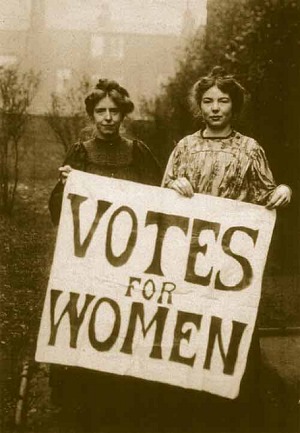New online records shed light on Suffrage movement
Free to search until International Women's Day

New online records reveal that “militant” Suffragettes were largely well educated, in their 30s and born in the South East
- Home Office & police files detail those on the front lines of the suffrage movement
- Records reveal that most “militant” suffragettes were well educated, in their 30s and born in the South East
- The Suffragette Collection has over 3,000 prison records, surveillance files, cabinet office papers and more
- British family history company Findmypast is making the collection free to search and explore until International Women’s Day, to celebrate this historic anniversary
Thursday 1st February: British family history website Findmypast in association with The National Archives has launched a new online collection of government records that tells the stories of individuals who fought for women’s suffrage. The Suffragette Collection, digitised from original records at Kew, reveals the struggles endured by the movement’s most ardent supporters and highlights the State’s response as it attempted to contain them.
The Suffragette Collection consists of more than 3,000 Metropolitan Police and Home Office records, many of which are now available online to the public for the first time. It has been launched to mark the 100th anniversary of the passage of the 1918 Representation of the People Act, the act that gave property owning women and female graduates over the age of 30 the right to vote for the first time in British history.
The information in these documents has allowed Findmypast to gather fresh insights into the makeup of a movement that changed British history. Key findings include:
- 91% of those targeted by police between 1908 and 1914 were female
- 73.2% were born in England, 6.7% born in Scotland, 3% born in Ireland, 2.8% born in India, 2.4% born in America, 2.4% born in Wales
- The mean year of birth for militant suffragettes involved in direct action during this period was 1872. This means that as women in their 30s, the majority would have secured the right to vote in 1918 provided they met the minimum property requirements.
- This also coincides with the immediate beneficiaries of the 1870 Forster's Education Act, showing that most of these women were amongst the first generation who went through compulsory state schooling.
- The majority of the women were well educated with significant numbers of teachers, doctors, nurses and writers, showing the impact of the expansion of higher education and access to universities
- 48.8% of English-born suffragettes were born in the South East, defined as Essex, Kent, London, Middlesex and Surrey. Notable contingents also came from the industrialised areas of Lancashire and Yorkshire.
- The few identifiably working class women primarily came from large cities and typically worked in factories in roles such as mill hands and weavers.
Today’s release marks the first phase of this ground-breaking collection and additional records will be added throughout 2018. To celebrate this historic anniversary, Findmypast is making the records completely free to search until International Women’s Day (March 8th), allowing family historians to explore their connection to this pivotal period of British history.
The collection brings together the stories of women from all classes who actively supported women’s suffrage, either by attending demonstrations and meetings or opting for militant “direct action”. Researchers can expect to find photographs, cabinet office papers, calendars of prisoners and Home Office papers on suffragette disturbances and prosecutions. The collection also includes an index of women arrested between 1906 and 1914, the official police watch list recording the details of over 1,300 militant suffragettes, reports of prison conditions, force-feeding, police surveillance and much more.
Tamsin Todd, CEO of Findmypast, comments: “We are honoured to bring these important documents online for the first time. This new collection offers unique insight into the incredible sacrifices made by women who risked health, livelihood and liberty in the fight for the right to vote. The Suffragette Collection, together with Findmypast’s world class British & Irish family history collections, provides everyone with the opportunity to discover their family’s connection to this important historical movement.”
Victoria Iglikowski, Principal Records Specialist - Diverse Histories, at The National Archives, said: “The National Archives collection offers a fascinating insight into the campaign for women’s suffrage. Our records often highlight personal experiences of female and male campaigners in their own words. Many of the files provide a first-hand account of demonstrations, court cases, imprisonment and force feeding. What is revealed is a highly organised, national movement from the smallest villages to the biggest cities, crossing class lines, in the first step towards voting equality”.
See also our news story 100 Years of Suffrage

